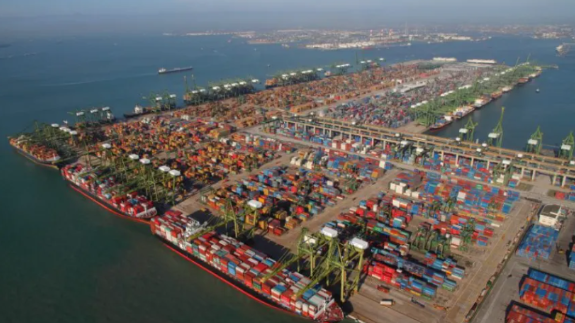On March 25, the State Taxation Administration (STA), in collaboration with the Ministry of Finance, Ministry of Commerce, General Administration of Customs (GAC), and the State Administration for Market Regulation, issued the Announcement on Optimizing Services and Regulating the Management of Exported Goods Subject to Domestic Taxes.
This announcement marks a major regulatory step toward addressing tax evasion practices associated with "buy order exports" (purchasing export declaration documents to fraudulently obtain export tax benefits). Export taxpayers, customs brokers, and relevant personnel are now prohibited from falsifying, altering, or trading customs declarations, fabricating export transactions, or misreporting or underreporting the value of goods.
Announcement on Optimizing Services and Regulating the Management of Exported Goods Subject to Domestic Taxes
Issued by: State Taxation Administration, Ministry of Finance, Ministry of Commerce, General Administration of Customs, State Administration for Market Regulation
Announcement No. 8 [2025]
In order to implement the directives of the CPC Central Committee and the State Council, further improve the business environment, and promote high-quality development of foreign trade exports, the following matters are hereby announced regarding the export service management of goods subject to domestic taxes (hereinafter referred to as "taxable export goods"):
1.When exporting taxable goods, taxpayers must pay VAT and consumption tax in accordance with existing regulations as if the goods were sold domestically.
Taxable export goods refer to those subject to VAT and consumption tax policies as defined in Articles 7 and 8 of the Notice on VAT and Consumption Tax Policies for Exported Goods and Services (Caishui [2012] No. 39).
2.Taxpayers shall declare and pay VAT and consumption tax for self-exported or commissioned export of taxable goods under the same rules as domestic sales. The applicable scope of taxation policies and tax calculation methods follow Caishui [2012] No. 39.
3.Taxpayers exporting taxable goods must register their information with tax authorities upon first tax liability and make truthful declarations in accordance with legally stipulated deadlines and contents.
If a taxpayer commissions the export, the principal must apply for a Certificate of Entrusted Exported Goods within the VAT/consumption tax declaration period of the month following the customs declaration date. This certificate must be handed to the agent, who uses it to apply for the Certificate of Exported Goods by Proxy.
4.Customs procedures must be handled in accordance with regulations. Export declarations must be filled out in a standardized, complete, and accurate manner.
Before declaring taxable export goods to Customs, the taxpayer must confirm registration information through the electronic tax bureau or tax service office. If the taxpayer is in an abnormal status such as deregistered, abnormal, or missing, these issues must be resolved before customs procedures can be completed.
Entities engaged in transport agency, customs clearance, accounting, tax services, and related foreign trade services must comply with legal and regulatory requirements.
5.Before applying for deregistration with the market supervision authority, taxpayers must apply for tax deregistration and provide a tax clearance certificate unless such data is shared electronically.
6.Export taxpayers, customs brokers, and related personnel are strictly prohibited from forging, altering, or trading customs declarations; fabricating export businesses; or misreporting goods values. Violations such as document forgery, fictitious exports, underreporting or overreporting values, or assisting in such actions will be handled in accordance with the Law of the People’s Republic of China on the Administration of Tax Collection, Regulations on the Implementation of Customs Administrative Penalties, and other relevant laws. Criminal acts will be referred to judicial authorities.
7.Exporting enterprises must calculate and pay corporate income tax according to law.
8.Other matters not covered in this announcement shall continue to follow existing regulations.
9.This announcement shall take effect from the date of issuance.
Interpretation of the Announcement
1.Background:
To implement the directives of the central government, improve the business environment, and guide taxpayers in managing risks related to the export of goods subject to domestic taxes, this announcement reiterates and clarifies key policies and procedures. It aims to help exporters comply with their tax obligations and maintain order in foreign trade.
2.Scope of Taxable Export Goods:
According to Caishui [2012] No. 39, the taxable export goods include:
(1) Goods subject to VAT:
- Goods explicitly excluded from export tax refund by the Ministry of Finance and STA.
- Domestic consumer goods and vehicles sold to special zones.
- Goods exported during the suspension of tax refund eligibility due to fraud.
- Goods with falsified filing documentation.
- Goods with forged or inaccurate VAT exemption documents.
- Export cigarettes not declared or not verified within the deadline.
- Other cases such as:
- Use of blank customs/export documents by unauthorized third parties.
- Export operations executed by entities other than the declared exporter.
- Dual contracts for the same shipment (purchase and agency contracts).
- Inconsistent information between customs declaration and shipping documents.
- Exporters not assuming quality, payment, or tax refund risks.
- Use of export qualifications without actual export business involvement.
(2) Goods subject to Consumption Tax:
Goods that fall under the consumption tax regime must pay consumption tax as prescribed. Previously paid consumption tax in earlier stages will not be refunded or deducted.
3.VAT/Consumption Tax Calculation:
(1)VAT:
- For general taxpayers:
Output VAT = (FOB – bonded materials value) ÷ (1 + applicable rate) × applicable rate
- For small-scale taxpayers:
Payable VAT = FOB ÷ (1 + levy rate) × levy rate
(2)Consumption Tax:
Based on ad valorem, specific rate, or composite methods as stipulated by current tax laws.

Last
Cargo Ship Blaze off Manila: 12 Crew Rescued as Authorities Investigate Fiery Incident
A cargo vessel caught fire southwest of Manila, Philippines, on Sunday, forcing its crew to abandon ship.TheCastphill XVerupted in

Next
Monsoon Havoc: Severe Congestion Hits Key SE Asian Ports as Singapore and Klang Face 3-Day Delays
Southeast Asia is currently experiencing unusually intense monsoon conditions, with nearly a week of torrential rains causing sign




